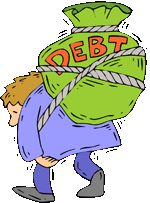News
Brother, Can You Spare a Dime?
Jul 24, 2008
 I hate debt. Other than a small mortgage, which we only have because it provides a tax deduction, my wife and I don't carry any consumer debt. I don’t even use a credit card anymore (which I used to pay off every month). Now, it’s strictly the debit card. I’m not looking for a medal. I’m describing a personality quirk. Debt makes me nervous.
I hate debt. Other than a small mortgage, which we only have because it provides a tax deduction, my wife and I don't carry any consumer debt. I don’t even use a credit card anymore (which I used to pay off every month). Now, it’s strictly the debit card. I’m not looking for a medal. I’m describing a personality quirk. Debt makes me nervous.
A recent, really scary article by Gretchen Mortenson in the New York Times reminded me why. “Given a Shovel, Americans Dig Deeper Into Debt” describes the hapless story of Diane McLeod, a middle-class woman from a thrifty home who ended up jobless, homeless, penniless, and under a mountain of debt. Some of the numbers in the story are terrifying: Americans carry $2.56 trillion in consumer debt, up 22 percent since 2000. The average household’s credit card debt is over $8,500, up 15 percent since 2000. But the numbers aren’t as scary as the reasons behind them.
Why all this growth in consumer debt? To paraphrase Field of Dreams, if the opportunity to borrow is there, they’ll come. And it is there aplenty following all the banking and investment deregulation that has gone on since the Reagan years, through Clinton, and bigtime during Bush. What it essentially comes down to is risk reduction. Lenders no longer have to assess the risks involved in lending—which used to be their primary responsibility—because they can lay off a loan as soon as they make it, and well before it goes bad, by packaging it into bundles of securities which are then resold and off their books. Along the way, lenders can assess all sorts of fees that make up for the initial come-on of unrealistically low interest rates.
McCain, who has confessed to a weak head for economics1, would have this situation continue. Obama has not, as yet, come out with an economic plan that does much to reverse the scandalous lack of regulation, or to restore the accountability, of lending institutions.
Money is a drug. And if our banks are going to stand on every street corner and whisper, “Psst! Want a taste?” to passersby because they stand only to reap the profits and are uninvolved in the consequences, then we need to treat them as we treat other such predators.
See also Going Under: A Nation in Debt
____________________
1"The issue of economics is not something I’ve understood as well as I should," quoted in “Responding to Recession,” by Paul Krugman, The New York Times, January 14, 2008 (Accessed July 20, 2008)
Copyright © 2008 All Together Now.